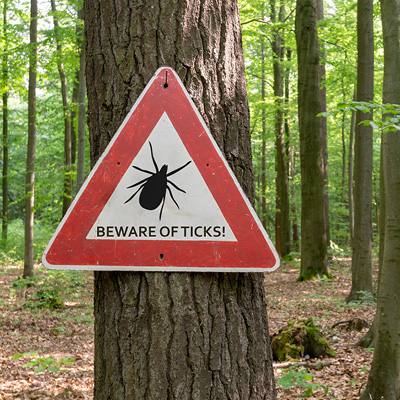Why Are Tick-Borne Illnesses On The Rise And What Do I Need To Know?
Posted May 31, 2022 by Shivonne N. Suttles, MD

This summer as you head out for hikes in the woods, camping and other fun outdoor activities, beware of unwelcomed visitors — ticks.
The tick population is on the rise and expanding their geographical range, and with that comes an increase in tick-borne illnesses. In fact, the annual number of cases of tick-borne diseases in the United States has nearly doubled since 2004, according to the Centers for Disease Control and Prevention, with Lyme disease representing the majority of cases.
Lyme disease, caused by the bacteria Borrelia burgdorferi, is transmitted to people by the bite of an infected blacklegged (or deer) tick. However, ticks can also spread Rocky Mountain spotted fever, anaplasmosis, babesiosis, ehrlichiosis and more.
Generally speaking, the tick needs to be attached for 36 to 48 hours before the bacteria can be transmitted. There are exceptions to this time rule, but the sooner you remove the tick, the lower your chances are of contracting the disease.
But, why are tick-borne illnesses on the rise in recent decades? Certainly, better recognition of symptoms and disease reporting can be attributed to the increase, but many experts believe environmental factors play a role, too.
One reason for a heavy increase in cases is a much larger and longer tick season, which increases the potential for human encounters with ticks. As parts of the country experience earlier springs and longer falls due to climate change, the optimal deer tick activity season (May - October) is ending later, and in some cases starting earlier.
In addition, warmer temperatures due to climate change are enabling ticks to spread and thrive in new areas. Warmer winters also increase the likelihood that ticks will survive them.
Suburban development also has brought people closer to forests and grasslands where ticks, deer, rodents and the germs they carry are often present.
In addition, new construction breaks up forests into isolated chunks, which enable rodents to thrive because there are lower numbers of larger predators. As rodent numbers rise, ticks have more hosts to feed on and it increases the odds of a tick feeding on a disease-harboring rodent. In fact, some studies have shown that tick-borne illnesses go up when rodent predators go down.
Protection against Lyme and other tick-borne illnesses
The only way to prevent yourself and your family from tick-borne illnesses is to not get bitten in the first place. While exploring outdoors, take these precautions:
- Avoid areas with high grass and leaf litter. Walk in the center of trails when hiking.
- Use an insect repellent that contains DEET.
- Consider wearing long sleeves, pants and closed-toed shoes in wooded or grassy areas.
- Treat dogs for ticks.
- Bathe as soon as possible after coming in from the outdoors. This way you can wash off ticks or even find them before they have a chance to bite.
- Conduct a full-body tick check using a mirror to check every area of your body. If found, remove ticks right away.
- Put dry clothes in a dryer on high heat for 10 minutes to kill ticks after you come indoors.
What to do if you have a tick bite
If you find a tick on your skin, remove it as soon as possible. A plain set of fine-tipped tweezers works well. Grasp the tick as close to the skin as possible and pull upward with a steady, even pressure. Then, clean the bite area thoroughly with rubbing alcohol or soap and warm water.
Watch the bite site over the next few weeks for signs of illness. Call your primary care provider right away if you develop any of the following:
- Skin rash, resembling a bullseye, around the infected bite
- Fever
- Fatigue
- Headache
- Muscle pain
- Joint swelling and pain
Prompt diagnosis and treatment are important if you contract a tick-borne illness, such as Lyme disease. Diagnosis can be based on the presence of the rash in the early stage or by a blood test in the later stages.
If the disease is caught in the early stage of the rash, within a few days or weeks, an antibiotic can be quite successful at treating the illness.
However, if left untreated, the infection can spread to the heart, joints and even the nervous system as part of later-stage infection, which can occur up to several months after the bite. The infection can become a serious condition that causes symptoms such as arthritis, heart palpitations, nerve pain and brain swelling. Antibiotics may also help in treating these later stages of infection.
Understanding the risk of tick-borne illnesses in your community and taking every precaution when venturing into the wilderness is the best way to prevent disease.
If you or someone you know may be experiencing symptoms of Lyme disease, see your primary care physician as soon as possible. To make an appointment with a Summa Health physician, call 234.867.7965.
About the Author
Vitality eNews Sign Up
Receive the Summa Health eNewsletter for the latest health tips, advice and updates.

